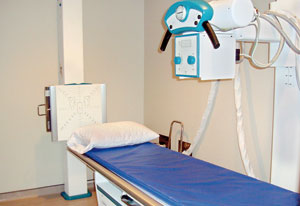With about 400 unlicensed X-ray machines operating in the country, with patients and operators exposed to varying doses of radiation, Atomic Energy Authority (AEA), the state body appointed to inspect and issue licences for the machines, warned the public to be cautious before undergoing an x-ray.
Earlier this week, the Ministry of Power & Energy warned the public of unlicensed X-ray machines, stating that it had instructed the AEA to confiscate such machines and take immediate legal action.
According to AEA’s Radiation Protection Division head Anil Ranjith, there are 750 licensed X-ray machines registered with the AEA, and about 400 un-registered X-ray machines mostly in private medical clinics.
“Medical diagnostic X-rays contribute the largest per capita dose of radiation to the population. Therefore, it is important to take provisions for radiation safety in the installation and housing of the X-ray units,” he said.
The location of the room, storage of unprocessed films in conventional radiology, room lightning, wall thickness, operators protection, shielding requirements such as lead, concrete and lead glass, interlock, warning signs, electrical and mechanical safety are some of the areas the AEA looks into before issuing a licence to operate an X-ray machine.
He said action has been taken against 30 institutions, but machines used in peripheral areas go un-inspected due to a shortage of inspection staff. This has led to a delay in action against offenders.
He said the public should be alert to whether the private medical clinic or hospital display their licence or the notice certified by the AEA.
He said according to Regulations on Ionising Radiation Protection of the Atomic Energy Safety, a radiation warning symbol should be displayed where radioactive material is used.
Sri Lanka College of Radiologists president, Dr. U. Samarasinghe said, if the radiation dose given is low, due to a sub-standard X-ray machine, the X-ray will be not clear and leads to a repeat in doses, which is harmful to the patient.
“X-rays are used for diagnosing medical conditions and to destroy cancer cells. But exposure to radiation can result in inducing cancer. Radiographers working in unsafe environment may suffer from cancers caused by long-term exposure to radiation. Most of the sub-standard machines are unable to control the dose of radiation,” she said. She said the AEA should conduct frequent inspections and cancel the licence of the medical institutes that do not maintain safety standards.
Dr. Samarasinghe said the room housing the X-ray equipment must be spacious enough to permit installation and the safety of the operating personnel.
“X-ray machine rooms should be secure from any radiation leaks. The doors should be lead-lined, otherwise people outside too will be subject to radiation. Children and expectant mothers visiting a hospital, medical institute or a clinic where there is an unlicensed X-ray machine, can become victim, even by a slight exposure to radiation,” she added. ” |


